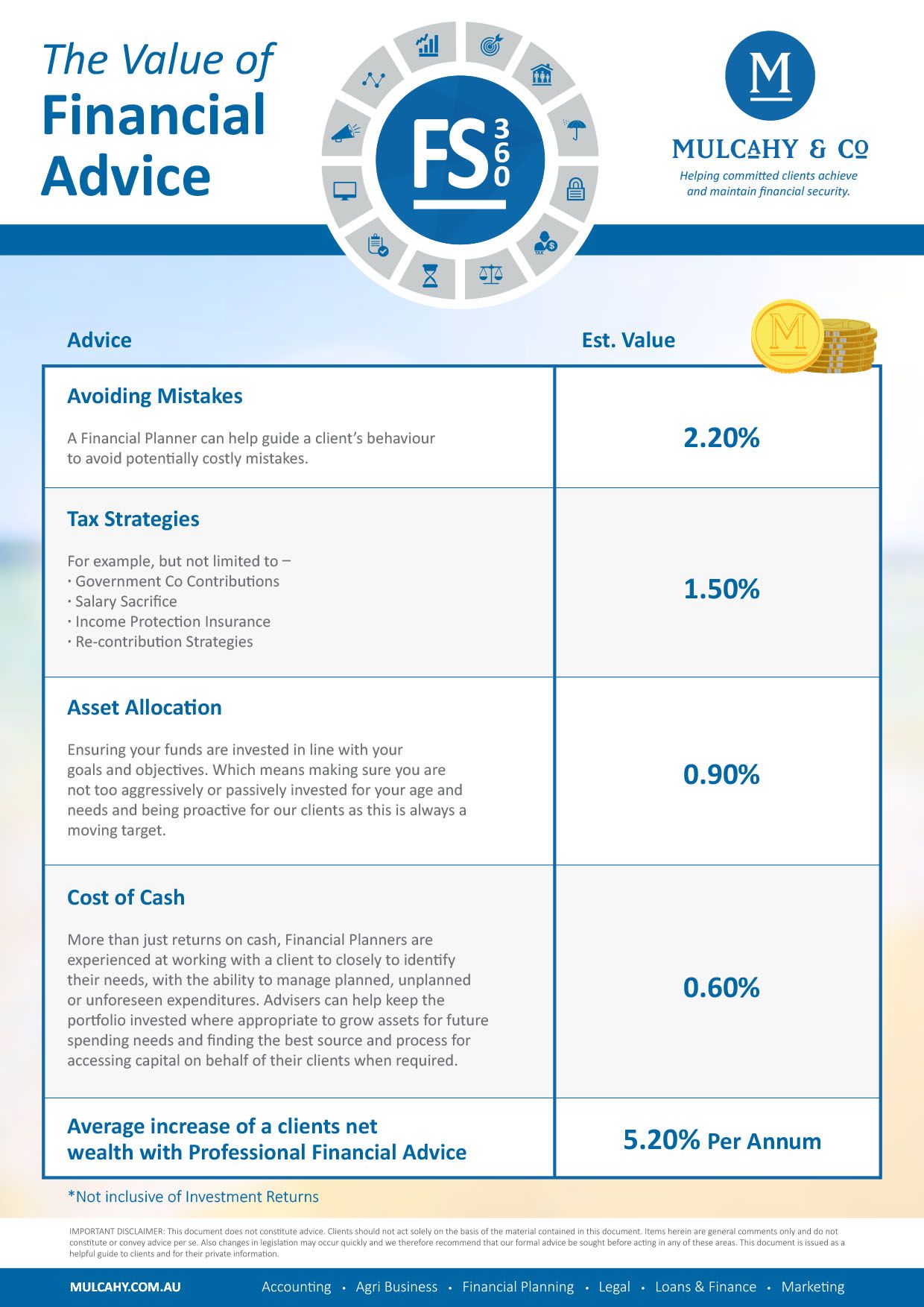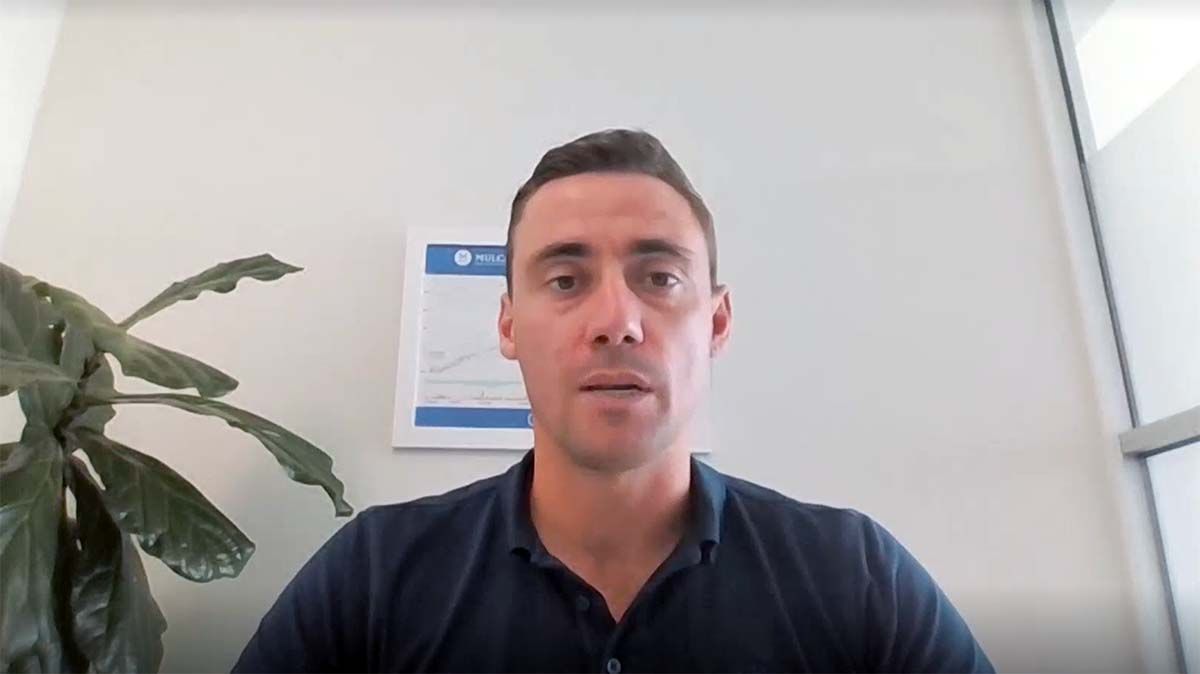Financial Planners
Being licensed directly with ASIC allows our Financial Planning division to tailor advice specific to your needs.
Mulcahy & Co’s financial planning branch is licensed directly with the Australian Securities & Investment Commission (ASIC). No other organisation, financial provider or investment company has ownership or control over the decision-making of our financial planners and financial advisers.
Our ASIC licence allows our team of financial advisers and financial planners to tailor advice specific to clients’ needs.
There is any number of reasons people might need a financial adviser or financial planner. You could be in a strong position financially, need help managing your money or you’re planning to retire or invest, the list goes on. Unless you have the time and knowledge, it is always useful to seek professional advice on financial planning. At Mulcahy & Co, we offer exactly that – professional financial services with expert financial advisers and financial planners.
Our Process in Financial Planning
Watch this informative video about how we go about assisting you on your way to financial security. Brought to you by Director Thayne Turley.
Our respected team of financial advisers and financial planners specialise in financial planning for a range of needs, including:
- Personal investment advice
- Pre-retirement and retirement planning
- Direct share broking
- Personal superannuation advice
- Employer/corporate superannuation services
- Negative gearing investment advice
- SMSF advice
- Aged care planning
- Personal insurance such as life insurance, total and permanent disability (TPD), trauma, income protection and/or business expenses insurance cover
- Centrelink and pension planning advice
Choosing a financial adviser is made easy with Mulcahy & Co. From the minute you first make contact with us, you’ll be confident you are dealing with the best financial planning firm.
Weekly update from our research partner Investsense


WHAT: The U.S. government shutdown has created a “data blackout,” forcing markets to rely on private reports showing job losses and weaker hiring.
WHY: Without official data, the Fed faces growing uncertainty at a critical policy moment, potentially increasing the risk of policy error if the labour market is weaker than it appears.
WHAT: Tech stocks led gains again, with AMD’s deal with OpenAI adding $80 billion to its valuation in one day.
WHY: The scale of AI spending, highlights how much optimism is priced in, leaving markets vulnerable if returns disappoint.
WHAT: Japan’s Nikkei hit record highs after Sanae Takenaka’s leadership win lifted hopes for fiscal stimulus and a weaker yen.
WHY: Markets welcomed Japan’s policy shift, and a dovish prognosis also sent the Yen lower. However Japan's large cap markets are notoriously liquidity-driven, while it’s also possible that a weakening Yen might attract the ire of President Trump.
WHAT: French markets fell as Prime Minister Lecornu’s resignation — France’s sixth in under two years — deepened political and fiscal uncertainty.
WHY: Persistent instability is undermining confidence in one of Europe’s largest economies, raising broader concerns about fiscal credibility.
WHAT: Australian households remain resilient, with solid spending and lower mortgage arrears, even as export earnings fall.
WHY: Domestic strength continues to cushion Australia from global volatility, but weaker trade data hint at how exposed the economy remains to slowing global demand.
Listen to the Investsense podcast for weekly updates:
Apple: https://podcasts.apple.com/au/podcast/the-investsense-podcast/id1497076117
Spotify: https://open.spotify.com/show/3xR4Vjn77KBpVOj2N15r1p
Financial Planning Services
Latest Financial Planning Updates


Don't take our word for it...
I have absolutely no doubt Lynde is one of the very best in her industry.
As part of the ageing process what to do with my nest egg savings and superannuation I found to be quite stressful and as the time got closer to accessing it the more I Googled and read about my choices the more confused I got. Lynde's awesome work ethic, excellent product knowledge and caring nature has enabled us to create a portfolio that really works well and suits our needs making this whole process a whole lot easier.
Thanks Lynde for your continued efforts and please keep up the brilliant work you and your experienced team do as we really do appreciate it.
~ G & L





